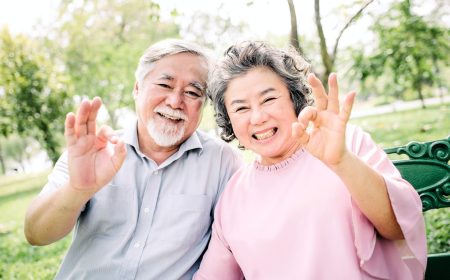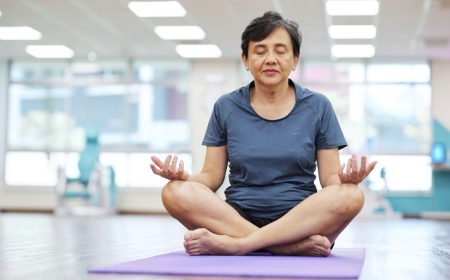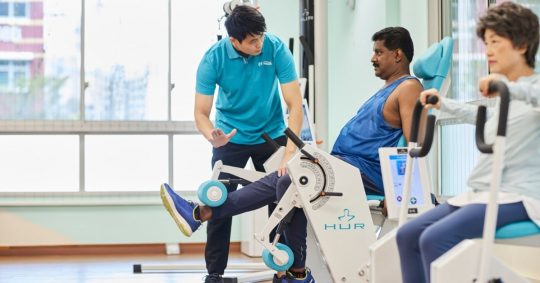
Find regular exercise with strength training at NTUC Health’s Active Ageing gyms
Seniors may not exactly be the first people that come to mind when we think about gym-goers. That being said, did you know that strength training is essential to ageing healthily? It allows you to develop the muscle density, immunity, and balance you will need to stay healthy and active. Beyond the physical benefits, there is also plenty to gain in maintaining your mental health and cognitive functions too.
If you hope to learn more about how strength training can help you improve your physical and mental functions, then this article is for you. We also share some tips on how you can select an appropriate training programme and suitable gym for seniors with NTUC Health.
In this article, we touch on the following:
Why seniors should start strength training
- Stay independent
- Reduce fall risk
- Strengthen immune system
- Reduce the risk of fractures
- Improve mental health
Exercising safely: Tips for seniors
- Check your suitability
- Use the right equipment
- Find a suitable programme
- Get proper supervision
Why seniors should start strength training
1. Stay independent
Functional mobility is a crucial aspect of healthy aging. It has to do with one’s ability to move around independently and safely, in order to perform everyday tasks like carrying groceries, picking up fallen items, using the toilet and going on walks.
By age 40, most people lose about 3 to 5% of their muscles every decade[1]. And by age 60, sarcopenia sets in. This age-related condition is characterised by the gradual loss of muscle mass and affects almost a third of Singaporeans aged 60 years and above[2].
To prevent muscle loss and stay independent, you can begin your fitness plan today. And remember, it’s never too late to start—you can gain muscle mass at any age with proper training.
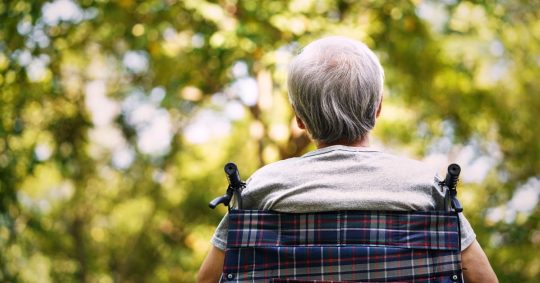
An excessive fear of falling is often associated with depression in seniors.
2. Reduce fall risk
About a third of seniors aged 65 years and older, fall at least once within a year[3]. Besides getting injured, they may become fearful of falling, which could lead to reduced activity levels, anxiety or even depression.
Although there are several causes of falls, two major risk factors are leg weakness and poor balance. Regular exercise, along with weight training, prevents your muscles from becoming deconditioned from the lack of activity.
Core stability exercises such as crunches and bridges, for instance, have also been found to help seniors reduce the risk of falls[4]. With improved strength and stability, you can regain the confidence to go about your daily activities.
3. Strengthen immune system
Our immune system declines with age – this means that seniors are more vulnerable to falling ill. However, exercise goes a long way towards maintaining the immune system through the ageing process.
Engaging in regular physical activity has several benefits in the long run, including a reduced risk of contracting infectious disease[5].
4. Reduce the risk of fractures
Strength training can help to prevent common age-related conditions, such as osteoporosis and osteoarthritis. Osteoporosis is a condition that occurs when bones lose their mass and strength. Since the bones are more brittle, seniors with osteoporosis are more prone to fractures.
Strength training is known to be one of the most beneficial exercises for preserving bone density. When you exercise with weights, bone-forming cells are stimulated and spring into action, slowing down the loss of bone[6].
Targeted and progressive gym-based exercises can also benefit older adults with osteoarthritis, where cartilage within a join breaks down due to wear and tear. Strengthening the muscles around the affected joint helps in reducing pain and inflammation, and improving your mobility.
5. Improve mental health
Beyond the physical benefits, those who regularly engage in strength training are likely to see improvements in their mental health and cognitive functions.
For one, weight training can provide you with renewed confidence in your physical abilities – you might just find yourself exploring new activities with your friends! Knowing you can go about your day-to-day activities independently helps to dispel the fear of falls and improve quality of life.
Studies have also shown that lifting weights at least twice a week can beneficially change the structure of the brain[7]. Age-related shrinkage of the brain’s white matter can be slowed with light resistance training, and when done right, can help you stay alert, and preserve memory and cognitive functions as you age.
Exercising safely: Tips for seniors
Now that you are convinced of the benefits of strength training, you might be looking forward to hitting the gym! Here, we put together a list of things you ought to note about gyms for elderly before getting started.
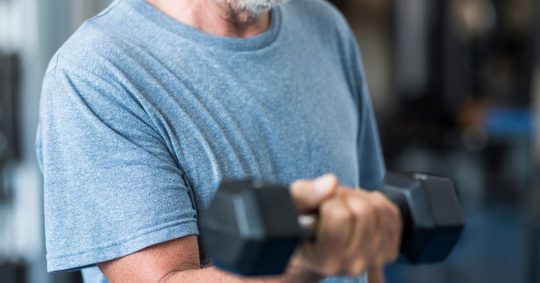
Many health conditions go unnoticed so it is important that your doctor has assessed your heart, lungs and joint functions.
1. Check your suitability
Have your prior injuries and underlying health conditions assessed through a health screening before setting foot in a gym. Gyms are mostly suitable for those who have the ability to move about independently, have no major health concerns, and are able to follow an exercise routine with guidance from a fitness instructor.
At NTUC Health’s elderly gyms, we offer a complimentary pre-class assessment to all newcomers. This allows us to gauge your suitability, as well as understand your fitness level. Prior to each gym session, we take your blood pressure to make sure you are safe and ready to train with us.
2. Use the right equipment
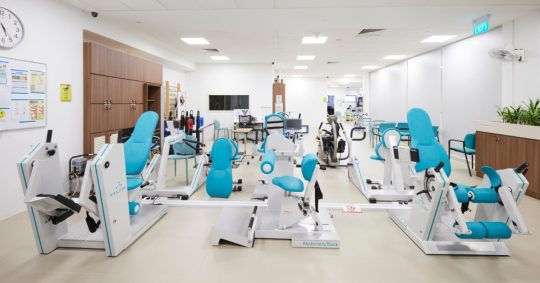
HUR and FREI machines at NTUC Health’s Active Ageing gyms are senior-friendly and safe on muscles and joints
When it comes to weight training for seniors, it is important that you use suitable gym equipment. Typical gym machines use high-resistance stacked weights. This may not be suitable for elderly users who may injure themselves while handling weights or bars.Find elderly-friendly gym equipment at NTUC Health’s elderly gyms, where our HUR and FREI machines make use of hydraulic (water pressure) or pneumatic (air pressure) technology to provide a safe and comfortable workout that is gentle on seniors’ muscles and joints. These machines allow for smaller weight increments that are easy for users to manage. The smart technology in the machines can also be configured to remember a user’s preferences and even record progress!
3. Find a suitable programme
Finding a strength training programme that is appropriate for your ability or condition will not only minimise your risk of injury, but also ensure that you focus on the right muscle groups and movements.
Before selecting a programme, find out if the gym provides programmes that serve elderly clients and learn more about whether the fitness programme can be structured to your preferred intensity.
At NTUC Health, we offer five different programmes for seniors: Gym Tonic, Circuit Training and Functional Strength Training. While the programmes are all designed to help seniors build muscle endurance, flexibility and balance, they are also customised according to intensity level and your preferred workout style.
4. Get proper supervision
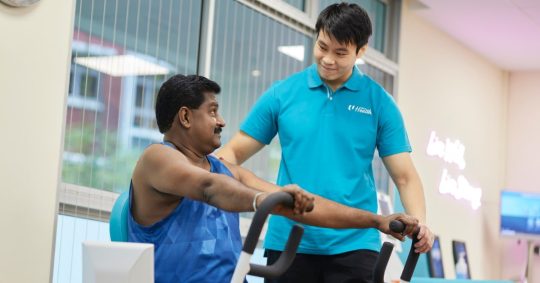
Find professional trainers at NTUC Health’s gyms for the elderly, who will invest in your progress and guide you through your fitness goals.
It is essential to have a qualified trainer supervise you as you work out. Seek a professional who is dedicated to supervise in small group settings, so that you always have someone to “spot” you and ensure that you are performing your exercises correctly. This will help to reduce the risk of injury, especially if you are new to the gym. The trainer should also monitor your progress and condition throughout the training programme and provide you with tips on how to reach your fitness goals.
Last but not least, a good trainer will motivate you and guide you to perform the exercises with confidence.
Summary
Having looked at both its physical and psychological benefits, it comes as no surprise that strength training is an essential part of active ageing. In fact, more than half of active agers who participate in our Circuit Training programmes can walk for longer and enjoy greater muscle strength, keeping them in shape well into their later years.
Get in touch with us
If you are looking for an elderly gym in Singapore that checks all the boxes in this article, contact us today!
Have a question or wish to enrol?
¹Declining muscle mass is part of aging, but that does not mean you are helpless to stop it. (Source)
²Sarcopenia in Singaporean Adults—The Yishun Study (Source)
³Approach to falls among the elderly in the community (Source)
⁴The effect of Core Stability Exercises on fall vulnerability (Source)
⁵Effect of exercise on immunity (Source)
⁶Effect of resistance exercise on bone health (Source)
⁷Lifting weights twice a week may aid the brain (Source)
